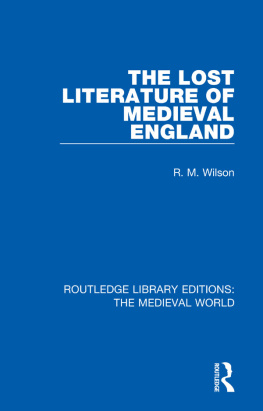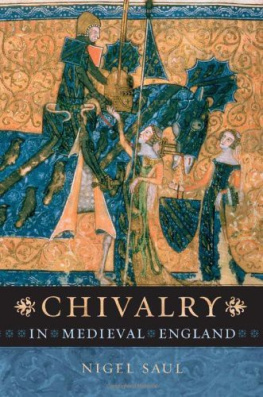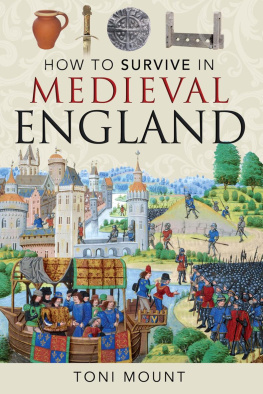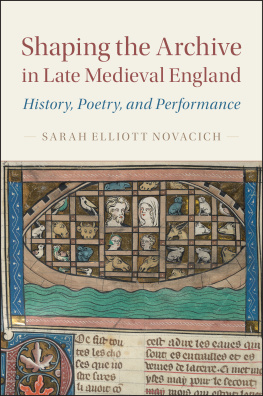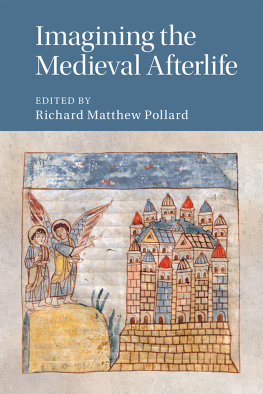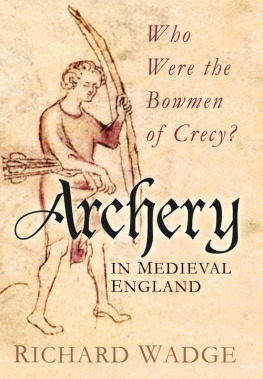ROUTLEDGE LIBRARY EDITIONS: THE MEDIEVAL WORLD
Volume 54
THE LOST LITERATURE OF MEDIEVAL ENGLAND
THE LOST LITERATURE OF MEDIEVAL ENGLAND
R. M. WILSON
First published in 1952 by Methuen & Co. Ltd
This edition first published in 2020
by Routledge
2 Park Square, Milton Park, Abingdon, Oxon OX14 4RN
and by Routledge
52 Vanderbilt Avenue, New York, NY 10017
Routledge is an imprint of the Taylor & Francis Group, an informa business
1952 R. M. Wilson
All rights reserved. No part of this book may be reprinted or reproduced or utilised in any form or by any electronic, mechanical, or other means, now known or hereafter invented, including photocopying and recording, or in any information storage or retrieval system, without permission in writing from the publishers.
Trademark notice: Product or corporate names may be trademarks or registered trademarks, and are used only for identification and explanation without intent to infringe.
British Library Cataloguing in Publication Data
A catalogue record for this book is available from the British Library
ISBN: 978-0-367-22090-7 (Set)
ISBN: 978-0-429-27322-3 (Set) (ebk)
ISBN: 978-0-367-19668-4 (Volume 54) (hbk)
ISBN: 978-0-429-20387-9 (Volume 54) (ebk)
Publishers Note
The publisher has gone to great lengths to ensure the quality of this reprint but points out that some imperfections in the original copies may be apparent.
Disclaimer
The publisher has made every effort to trace copyright holders and would welcome correspondence from those they have been unable to trace.
The Lost Literature of Medieval England
R. M. WILSON
METHUEN & CO LTD
II NEW FETTER LANE LONDON EC4
First published 1932 by
Methuen & Co. Ltd
Second edition, revised and reset 1970
First published as a University Paperback 1972
Hardback SBN 416 17000 5
University Paperback SBN 416 18410 3
1952, 1970 R. M. Wilson
Printed in Great Britain by
Butler & Tanner Ltd
Frome and London
This title is available in both hardbound and paperback editions. The paperback edition is sold subject to the condition that it shall not, by way of trade or otherwise, be lent, re-sold, hired out, or otherwise circulated without the publishers prior consent in any form of binding or cover other than that in which it is published and without a similar condition including this condition being imposed on the subsequent purchaser.
Distributed in the U.S.A. by
HARPER & ROW PUBLISHERS, INC.
BARNES & NOBLE IMPORT DIVISION
TO
DOROTHY
AND
ANNE
CONTENTS
Archiv.Archiv fr das Studium der neuren Sprachen und Literaturen.ASS.Acta Sanctorum apud socios Bollandianos.AsserW. H. Stevenson,
Assers Life of Alfred (London 1904).B.M.British Museum.Bodl.Bodleian Library.
Canterbury and DoverM. R. James,
The Ancient Libraries of Canterbury and Dover (Cambridge 1903).C.C.C.C.Corpus Christi College, Cambridge.
Chronica MajoraMatthew Paris,
Chronica Majora (RS. 57).
CollectaneaJ. Leland,
Collectanea, ed. T. Hearne (London 1774).
ContinuityR. W. Chambers,
On the Continuity of English Prose (EETS. 1932).CS.Camden Society.C.U.L.Cambridge University Library.
De Principis InstructioneGiraldus Cambrensis,
De Principis Instructione (RS. 21) viii.
Descriptio KambriGiraldus Cambrensis,
Descriptio Kambri (RS. 21) vi.EETSEarly English Text Society: Original Series.EETS. ES.Early English Text Society: Extra Series.
EHR.English Historical Review.EHS.English Historical Society.FabyanR. Fabyan,
The New Chronicles of England and France, ed. H. Ellis (London 1811).Florence of WorcesterFlorence of Worcester,
Chronicon (EHS. 13).GaimarG. Gaimar,
Lestorie des Engles (RS. 91).
Gemma EcclesiasticaGiraldus Cambrensis,
Gemma Ecclesiastica (RS. 21) ii.
Gesta PontificumWilliam of Malmesbury,
Gesta Pontificum (RS. 52).
Gesta RegumWilliam of Malmesbury,
Gesta Regum (RS. 90).HardyT. D. Hardy,
Descriptive Catalogue of Materials relating to the History of Great Britain and Ireland (RS. 26).HearneT. Hearne,
Peter Langtofts Chronicle (as illustrated and improved by Robert of Brunne) (Oxford 1725).Higden
Polychronicon Ranulphi Higden (RS. 41).
HMC.Historical Manuscripts Commission.HuntingdonHenry of Huntingdon,
Historia Anglorum (RS. 74).
Itinerarium KambriGiraldus Cambrensis,
Itinerarium Kambrice (RS. 21) vi.KerN. R. Ker,
Catalogue of Manuscripts containing Anglo-Saxon (Oxford 1957).Langtoft
Chronicle of Pierre de Langtoft (RS. 47).LelandL. T. Smith,
The Itinerary of John Leland (London 1907).Liber EliensisE. O. Blake,
Liber Eliensis (CS. 1962).Mannyng
Chronicles of Robert of Brunne (RS. 87).MapM. R. James,
Walter Map De Nugis Curialium (Anecdota Oxoniensia, part xiv: Oxford 1914).MEMiddle English.MHG.Middle High German.
MLN.Modern Language Notes.MLR.Modern Language Review.MonasticonW. Dugdale,
Monasticon Anglicanum, ed. J. Caley, H. Ellis, and B. Bandinel (London 1846).OE.Old English.OHG.Old High German.ON.Old Norse.OrdericusOrdericus Vitalis,
Historia Ecclesiastica, ed. A. Le Prevost (Paris 183855).
PMLA.Publications of the Modern Language Association of America.RS.Rolls Series.
Speculum EcclesiGiraldus Cambrensis,
Speculum Ecclesi (RS. 21) iv.SS.Surtees Society.STS.Scottish Text Society.Symeon of DurhamSymeon of Durham,
Historia Regum (RS. 75).WartonT. Warton,
History of English Poetry, ed. W. C. Hazlitt (London 1871).WendoverRoger of Wendover,
Flores Historiarum (EHS. 8).
This survey of the lost literature of medieval England is an attempt to provide concrete evidence for the statements often made on the subject. It is hoped that by placing it side by side with the histories of the extant literature a much truer picture of the extent, growth, and development of Old and Middle English literature may be gained. Few of the topics or stories mentioned in the following pages have been dealt with exhaustively this was inevitable if the study were to be kept within reasonable bounds but it is hoped that enough indications are given to allow any interested reader to carry out further investigations for himself.
The title is necessarily more concise than correct. At the best such a study could deal only with the literature which has left some trace, and it is obvious enough that much must have disappeared leaving no indication whatever of its former existence. Moreover, even within these inevitable limits, no claim can be made for comprehensiveness. Such a title should include chapters on Anglo-French and Anglo-Latin, and material is available for these, but nevertheless the two literatures have been intentionally omitted. One or two catalogues of monastic libraries, and some collections of medieval wills, although in print, have not been available to me. Moreover, many medieval wills still remain unpublished, as well as lists of books and perhaps the occasional catalogue of a monastic library. Nevertheless, if we may judge from the numerous documents of this type which have been examined, it is unlikely that those which have not been seen would contain much of interest. On the other hand, it is certain that a closer scrutiny of the medieval Latin and vernacular chronicles would bring to light many other stories which must have been current during the Old and Middle English periods. Here it has seemed wiser to limit the selection to those stories for which the available evidence indicates a fairly wide distribution, rather than PREFACEto attempt an inclusiveness which would in any case be impossible of achievement. The chapter on the lyric is also certainly incomplete, and a wider examination of medieval manuscripts would probably result in the discovery not only of numerous fragments but of some complete poems. Nevertheless it is hoped that, despite such shortcomings, the evidence here presented is enough to justify the conclusions that have been drawn in the final chapter.


